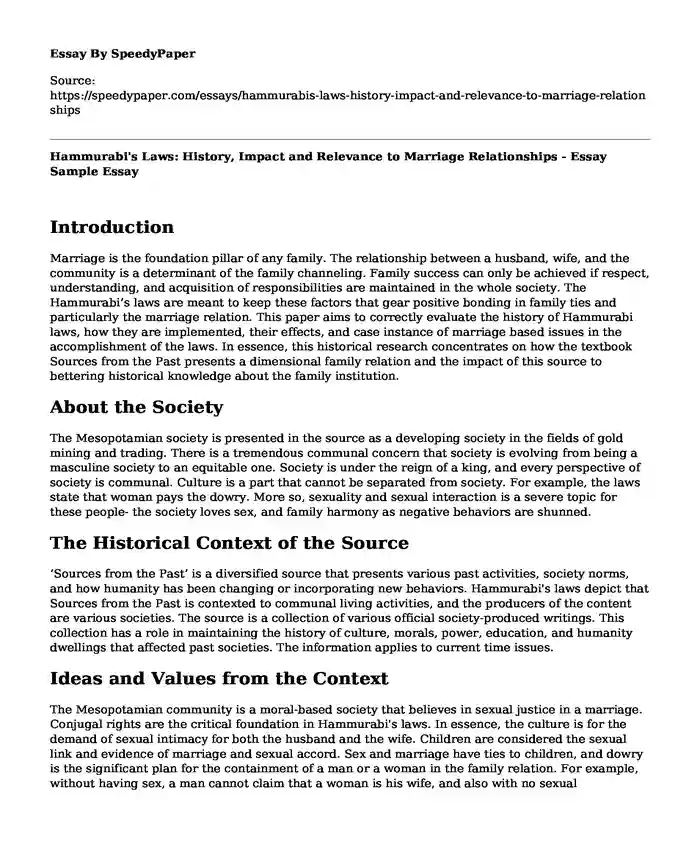
| Type of paper: | Essay |
| Categories: | Society Relationship Public relations |
| Pages: | 4 |
| Wordcount: | 828 words |
Introduction
Marriage is the foundation pillar of any family. The relationship between a husband, wife, and the community is a determinant of the family channeling. Family success can only be achieved if respect, understanding, and acquisition of responsibilities are maintained in the whole society. The Hammurabi’s laws are meant to keep these factors that gear positive bonding in family ties and particularly the marriage relation. This paper aims to correctly evaluate the history of Hammurabi laws, how they are implemented, their effects, and case instance of marriage based issues in the accomplishment of the laws. In essence, this historical research concentrates on how the textbook Sources from the Past presents a dimensional family relation and the impact of this source to bettering historical knowledge about the family institution.
About the Society
The Mesopotamian society is presented in the source as a developing society in the fields of gold mining and trading. There is a tremendous communal concern that society is evolving from being a masculine society to an equitable one. Society is under the reign of a king, and every perspective of society is communal. Culture is a part that cannot be separated from society. For example, the laws state that woman pays the dowry. More so, sexuality and sexual interaction is a severe topic for these people- the society loves sex, and family harmony as negative behaviors are shunned.
The Historical Context of the Source
‘Sources from the Past’ is a diversified source that presents various past activities, society norms, and how humanity has been changing or incorporating new behaviors. Hammurabi's laws depict that Sources from the Past is contexted to communal living activities, and the producers of the content are various societies. The source is a collection of various official society-produced writings. This collection has a role in maintaining the history of culture, morals, power, education, and humanity dwellings that affected past societies. The information applies to current time issues.
Ideas and Values from the Context
The Mesopotamian community is a moral-based society that believes in sexual justice in a marriage. Conjugal rights are the critical foundation in Hammurabi's laws. In essence, the culture is for the demand of sexual intimacy for both the husband and the wife. Children are considered the sexual link and evidence of marriage and sexual accord. Sex and marriage have ties to children, and dowry is the significant plan for the containment of a man or a woman in the family relation. For example, without having sex, a man cannot claim that a woman is his wife, and also with no sexual satisfaction, the woman is allowed to jurisdiction the man where the dowry will be refunded. Mistakes in the marriage fraternity are communal where the man and the woman each confess. However, some masculinity is depicted in Hammurabi's laws. Machismo, as it is referred, is highly appreciated as the laws favoring men are more than those in women's token. Lastly, the source gives an idea of a culture that is very harsh. Most cases where family and marriage crime are committed, the only way of punishment is draining the offender in rivers, or the offended have to give some dowry refunds.
Historical Developments
Power, Gender and Social Structure Entities
In the sources from the Past, Hammurabi's laws are implemented by supreme personalities in society. More so, the man has power over a woman. For example, the woman is bound to serve the man in sexual conjugation. In short, the man's family has authority over the marriage deal earned from the endowment. Besides, the source describes the state of family and marriage context before the Hammurabi laws were initiated- there is no gender equality. In Hammurabi's laws context, the source reveals that a woman is more endangered to punishment. For example, when a man sleeps with a virgin before marriage, the woman cannot escape the jurisdiction as there is evidence while the man can.
Historically, the source has excellent dimensions or preserving and developing the social structure evident in the Mesopotamian community. Hammurabi's laws have been passed through generations only using references from the Past, and this will remain forever in the history of humanity concerned with the line of this community. Classical education is worth and can only be through evidence of sources from the Past.
Conclusion
Sources from the Past is a contextual book that pertains to reliable information of political, cultural, and social structures concerned with family ties in the past communities. There is significant relevance to the source in historical development, particularly in the study of human evolution in terms of culture, tradition, region, and communal settings. The Hammurabi laws are great authentic content that gives the origin and travels of change in gender and marriage ties. The way this article is aligned gives a proper understanding for a researcher or a philosopher to identify and link today's living to that of the past men- humanity needs history to guide and enact change.
Cite this page
Hammurabi's Laws: History, Impact and Relevance to Marriage Relationships - Essay Sample. (2023, Nov 15). Retrieved from https://speedypaper.com/essays/hammurabis-laws-history-impact-and-relevance-to-marriage-relationships
Request Removal
If you are the original author of this essay and no longer wish to have it published on the SpeedyPaper website, please click below to request its removal:
- Gender Roles In Society Essay Sample
- Deportation Law of the United States in the Free Essay
- Free Essay Explaining Lower Latino Violent Crime Rates than Those Committed by African Americans
- Recruiting Minorities for Police Force: A Historical Perspective. Paper Example
- Free Essay Example on Appeal to Congress for Impartial Suffrage
- Essay Example: Nursing Perceptions
- What Is Katz's Main Argument Regarding Porn and What It Does? Free Essay
Popular categories




